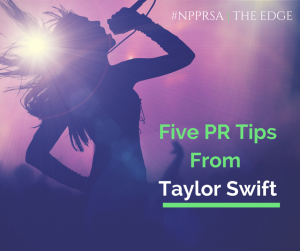Editor’s note: This is the first post in our monthly #ThrowbackThursday series, which features a prominent, successful PR pro taking a look back and sharing tips from his/her days as a new pro. Thanks to Deirdre for helping us kick this off!
For those who don’t know her, Deirdre Breakenridge is the chief executive officer at Pure Performance Communications. But, like most successful PR pros, that’s only the beginning of her portfolio.
 She’s the author of five Financial Times books, including her latest “Social Media and Public Relations: Eight New Practices for the PR Professional,” an adjunct professor at New York University, a member of PRSA (woohoo!), and co-founder of #PRStudChat, a dynamic Twitter discussion scheduled monthly for PR students, educators and PR pros.
She’s the author of five Financial Times books, including her latest “Social Media and Public Relations: Eight New Practices for the PR Professional,” an adjunct professor at New York University, a member of PRSA (woohoo!), and co-founder of #PRStudChat, a dynamic Twitter discussion scheduled monthly for PR students, educators and PR pros.
Honestly, we could fill this post with all of her work and achievements, but we know what you’re all here for: Deirdre’s life lessons! So, without further ado, let’s dive in.
Question 1: What were three of the biggest challenges you faced as a new professional in the PR industry and how did you overcome them?
- Thinking you’re prepared when you’re not. No matter how junior the team member, you must come into a meeting fully prepared. However, this goes far beyond having a pad and pen to take notes. Being prepared involves challenging yourself to think about and answer the questions that a supervisor / boss may ask you during the meeting. Still to this day, I coach professionals to think ahead. And, if they are in a meeting with executives it’s important to identify what they would ask, or need long before the meeting begins.
- Rejection from the media. Rejection is a part of public relations, especially when it comes to media pitches. Even in the face of rejection, you must continue to perfect your pitching efforts by spending more time doing homework about the journalists / bloggers you’re pitching, and the communities they serve. Relationships develop over time, so if you are persistent and consistently offer good information, then you are more likely to land a really good story and be recognized as a reliable source.
- Networking more often at association meeting and special events. Not everyone is a natural born networker and making good connections requires you to get out there to meet people. When you’re a young professional it can be difficult to walk into a room not knowing anyone and strike up a conversation. However, the more opportunities you take to network, the more you realize that people are at these events for the very same reason. What is the worst that can happen? Perhaps, you introduce yourself and shake hands. Then, you exchange business cards and move on to meet someone else. However, there will be those instances when you meet someone and there is a great connection. What may come out of a simple introduction can be a number of opportunities. I learned early on that not every person you meet will lead to a next step connection, but you will never know unless you try.
Question 2: What type of time management tools did you use to stay on track as a new professional?
In the past, time management for me was a big black planning book that I carried everywhere and a large calendar sheet on my desk that was marked up daily. Then, about 10 years into my PR career, time management software was integrated into our agency, and we no longer had to fill out manual time sheets. I think I just dated myself!
However, what I would recommend to young professionals today are several apps to make them more organized. I’m a big fan of Evernote, which is the note taking software that allows me to capture notes, ideas and images, and then syncs on all of my devices. I also use Circa, which is a news app that curates the important news headlines. There is a scanner app that I find very helpful. It allows me to scan documents into PDF form and then share them. Of course, my Google calendar keeps me organized and on track, with alerts so I can properly prepare for my meetings. Lastly, Spreeder is free online speed-reading software designed to improve not only your reading speed but also your comprehension.
There are many great apps and tools. This article from Lifehack has several really good time saving resources that you can check out here.
Question 3: What were some of your most important career goals as a new professional?
Building relationships was at the top of the list. It is your network of connections that will allow you to excel in business and to help others (Click to tweet!). There is so much that goes into relationship building, but it all starts with getting to know people, learning more about them and listening, rather than immediately sharing information about yourself. To be known as someone who is connected, or that you’re a great connector, is very valuable, and often sought out by companies large and small.
Focusing on your integrity as you pursue new opportunities. There will be times that your values and integrity may be challenged, and you will have to make an important decision. Always choose the ethical side of the situation and your integrity will remain in tact for the duration of your career. If you need a refresher on ethics, you can check out the PRSA Code of Ethics. At the end of the day, you have to be sure that your communication is transparent and in the best interest of all parties involved. Always let your values and ethical standards guide you.
Perfecting your writing skills. If you’re in PR today, then writing for all different types of media is important. We have moved from earned media to owned, paid and shared. Companies are looking for professionals who are not only able to write byline articles, editorial opinion pieces and news releases, but also blog posts, video scripts, tweets and Facebook updates, ebooks, etc. Perfecting your writing skills takes a lot of practice and also requires you to read in your spare time. The more you read the better your writing will become. I’ve been writing for 25+ years. Practice makes perfect, and for me, led to some incredible writing opportunities, including several books published by Financial Times Press.
Question 4: How can today’s new professionals find time to focus on personal career goals without getting sidetracked by work?
Careers can get very busy and you will always find yourself sidetracked. You have to make a date with yourself to find time to focus on your personal goals. If you’re a morning person then you should set aside the time then, or if you like to stay up late at night, then this may be your best time plan out the steps to reach your personal career goals. You should also incorporate regular telephone, Skype and in-person meetings into you weekly routine, so that you can meet people, get different perspectives and learn about new career directions. In addition, finding a mentor will help you to grow in your career and to have a seasoned professional guide you as you strive to reach your personal career goals.
Question 5: If you could go back in time and give advice to yourself during your first year on the job, what would you say?
My first year of work was an incredible experience, so I’m not sure what I would have changed or where I would have given myself advice. But, I do remember my second job, wishing I had given myself some advice early on.
I was doing PR for a cosmetology school that was affiliated with a popular hair and skin care company. I remember, within my first couple of weeks of working there, I was asked to model for one of their hair fashion shows. It was an honor and then quite a shock when I was on stage and they cut my hair above my ears and colored it bright red. After the show, I had to keep my hair short and colored. They also gave me a lot of makeup that I was supposed to wear as a representative of their company and advised me on my wardrobe. But, It just wasn’t me.
Although I had fun and stayed with the company for a few years, I eventually realized that I wasn’t being true to myself. Almost like a “Devil Wears Prada” movie scenario. After I left, I grew out my hair, went back to my natural color and found my own style of fashion. If I could go back in time, I would say to myself, “Be true to who you are from the work that you do to how you present yourself (including your appearance) in any role that you play.
If you can learn this early on you’ll be a lot happier!
To learn more about Deirdre, visit deirdrebreakenridge.com or follow her on Twitter at @dbreakenridge.


